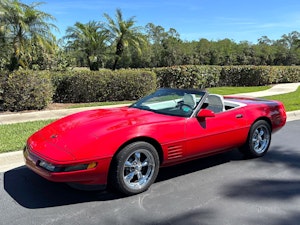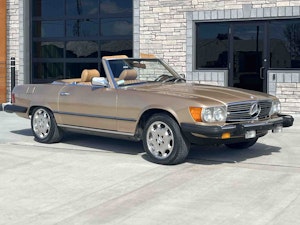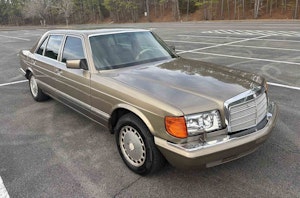Media | Articles
Why Volvo’s attempt at virtue-signaling falls flat
Have you heard? Starting next year, new Volvo automobiles will no longer be able to exceed 112 mph, in the name of safety. It is unclear whether the restrictions will be retroactively applied to older models, such as the evergreen 240DL, which could be limited to 112 mph by means of an additional turbocharger, intercooler, and sixth gear, or the transverse-engined 850/S70 models, which could be limited to 112 mph by placing an electronic governor on the tow trucks currently carrying them to the junkyard. Let’s not forget the Focus-by-another-name S40, in which the top speed will be limited by restricting the size of the hills down which it could be pushed.
I could go on, but surely you see the absurdity of this already. Volvo’s reputation for Autobahn-style pace and performance is so meager, and so tenuous, that this publicity stunt is effectively equal to a public decision by TGI Friday’s to ban Michelin reviewers from its restaurants, or perhaps an announcement by the band Rush that ladies will no longer be permitted to attend their performances. What’s next? Will Honda loudly declare that its dealers are prohibited from fitting a fifth-wheel tow hitch to the Ridgeline?
It’s a neat trick to hastily retire from the field of combat and declare victory on moral grounds, but if Volvo is expecting hosannas from the horn-rimmed spiritual descendants of Joan Claybrook and Ralph Nader, they’re likely to be disappointed. First of all, 112 mph is far faster than any government or nonprofit-foundation mandarin in existence can possibly accept as a maximum speed for personally-directed travel. If you took your Volvo to the infamous 85-mph Texas toll road and ran it up to its “safe” limit, you’d be 27 mph over the line, Swede Genius—and eligible for a free roadside cavity search from a Texas State Trooper.

Alternately, try running your new S90 into a bridge abutment at a buck-twelve. Do you really think that the car’s passive safety systems will save your bacon? Volvo claims, and I quote the press release here, that “above certain speeds, in-car safety technology and smart infrastructure design are no longer enough to avoid severe injuries and fatalities in the event of an accident.” Is that speed… one hundred and thirteen miles per hour? The next time it snows, should you feel free to go rippin’ down the road at a low triple-digit speed, confident that the various TLAs (three-letter acronyms) fitted to your CBV (Chinese-Built Volvo) S90 (Sedan, About 90-Percent As Prestigious As Another Yet Un-Named, But Probably German, Sedan) will SYA (Save Your Assets)? This whole VSL (Voluntary Speed Limit) business verges on the UFS (Unforgivably Freakin’ Stupid).
Marketplace
Buy and sell classics with confidence
Ah, but before we spend the rest of our time together today just making fun of the idea, we should consider that perhaps the fine people at Volvo are not nearly as silly or stupid as this 112-mph business would make them appear at first glance. We should consider, instead, that they are actually quite smart, and that they have introduced this limit with specific and well-planned goals in mind.
There are two possibilities which immediately occur to me, and perhaps to you. The first is that Volvo has, after various fits and starts with turbocharged wagons, World Challenge racing, and the bewildering Polestar badge, finally realized that it will never have a BMW’s worth of credibility with the Euro-performance crowd. Faced with the two options of:
1. Giving up and letting the Germans have all the sales volume
2. Continuing to build performance Volvos which rust on dealer showroom floors
… they have instead cleverly chosen to:
3. Declare that performance cars are a social menace and voluntarily curtail their efforts in the hopes that various European governments will make this voluntary position a mandatory one.

See the brilliance at work here? It doesn’t matter if you never exceed 80 mph in your life; if every car on sale is limited by law to 112 mph, some percentage of buyers will decide that they might as well get a car which excels in other areas, such as the possession of an Orrefors crystal shift knob. Some of you will point out that this experiment was already tried in Japan, and that people bought Skylines anyway—but I would suggest that fewer Skylines were sold as a result of the Japanese law.
If this is Volvo’s thinking, then I have a serious personal issue with its behavior here. Attempting to cajole lawmakers into adjusting the law to suit your product line is not something that sits well with most Americans, myself included. If you need proof of this, ask William Ruger, and that is all I have to say on that subject.
Let’s assume that Volvo isn’t really trying to ruin everyone’s fun just so it can get away with selling four-cylinder luxury cars. Let’s assume, instead, that Volvo is engaging in the currently-fashionable practice of “virtue signaling,” sometimes known pejoratively in the corporate context as “Woke Capital.” The latter term refers to when a company decides to take a stand on a social issue for reasons unknown to the rest of us but which presumably include some sort of internal power struggle. If you’ve ever asked yourself, “Why does my local refuse-collection agency or hot-dog stand have a published position paper on sheep-shearing in Peru?” then you’ve seen Woke Capital at work.

One hundred years ago, Woke Capital often took the form of religious proclamations or endorsements by corporations. Fifty years ago, it meant sponsoring Masterpiece Theatre. Today, it means encouraging the establishment of laws and regulations for social change. So Volvo has decided to be a “thought leader” in the area of pedestrian and driver safety, which means saying all the usual Good Things about the usual Good Ideas.
(Note, also, that Volvo’s press release includes a paragraph about distracted driving. Whether it is more dangerous to text-n-drive at 113 mph instead of 112 mph is, however, left up to the reader’s interpretation.)
The intended effect of this virtue-signaling goes something like this: You, a socially conscious individual, are enjoying a nice cup of socially-conscious coffee in a socially-conscious coffee shop. You see that Volvo has decided to voluntarily limit the speeds of its cars. You immediately call the dealership, cancel your order for a Mercedes-AMG G65 6×6 “Dubai Edition,” and demand a Volvo instead.

Two days later, you lose a street race with a fellow Greenpeace member when his Tesla hits 113 mph and disappears from your windshield like Doc’s DeLorean. OK, that last part isn’t supposed to happen, but you get the idea, right?
Only time will tell if Volvo’s social stand here is good or bad for business. I can tell you what I would do, were I to find myself at the head of a competing automaker such as Acura or Lincoln: I’d get an RLX or a Continental out to the salt flats pronto, along with a film crew, and as the speedo needle swept past 150 mph on the way to hyperspace I’d have the narrator of my commercial intone something like:
“Here at Lincoln, we don’t place an arbitrary speed limit on your 400-horsepower Continental Coach Door edition. Because our customers live…” and here the camera dollies back to show the tail of the sedan rushing away, “…without limits.”
Is it a good idea? Would it sell cars? What about that fact that most modern performance sedans already have a limiter, albeit one that’s set considerably higher? Could the 240DL actually reach 112 mph, assuming it was drafting a Mercedes-AMG G65 6×6 “Dubai Edition”?
Tune in next Tuesday for a new episode of “Avoidable Contact,” where none of those questions will be answered!













